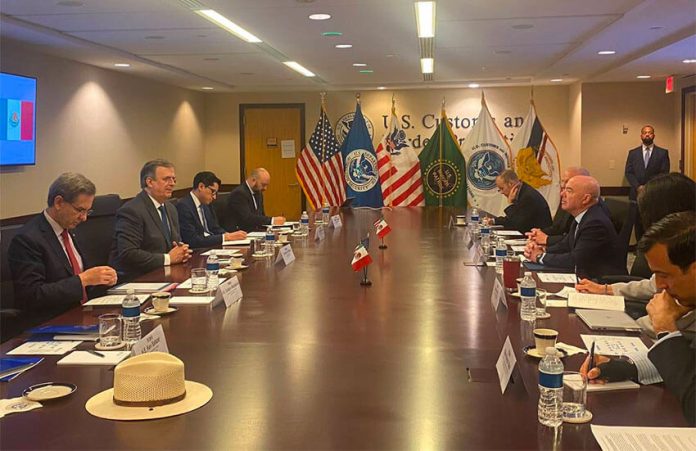The Mexican and United States governments have agreed to divert some northbound cross-border traffic away from Texas to New Mexico in retaliation for the strict vehicle inspection program implemented by the Lone Star State last month.
Some traffic will be diverted to the border crossing between San Jerónimo, Chihuahua, and Santa Teresa, New Mexico.
The crossing, located about 70 kilometers south of Las Cruces – New Mexico’s second largest city – and approximately 25 kilometers west of El Paso, Texas, is set to be expanded to cope with increased commercial vehicle traffic.
The decision to divert some traffic to that crossing was taken Tuesday during a meeting between Foreign Affairs Minister Marcelo Ebrard and United States Secretary of Homeland Security Alejandro Mayorkas in Washington. It will take months to implement, the newspaper Milenio reported.
Ebrard said on Twitter that he spoke to Mayorkas about “new infrastructure for the border with New Mexico in San Jerónimo-Santa Teresa to facilitate binational transport.”
Mexico’s ambassador to the United States, Esteban Moctezuma, and the U.S. ambassador to Mexico, Ken Salazar, were among the other officials who attended the meeting.
Milenio said it was informed by diplomatic authorities that the final decision to expand the New Mexico border crossing was taken after reaching the conclusion that Mexico couldn’t trust Texas as a trade partner.
In early April, Governor Greg Abbott – who claims that the U.S. government isn’t doing enough to secure the border with Mexico – directed Texas authorities to conduct more thorough inspections of all commercial vehicles crossing into the state from Mexico in order to detect drugs and migrants trying to enter the U.S. illegally.
The more stringent vehicle inspection program, which lasted about a week, caused long delays for truckers trying to cross into Texas and generated huge economic losses. It was suspended after Abbott reached agreements with governors of four Mexican border states, who committed to enhancing security measures on the southern side of the border.
Ebrard accused the Texas governor of extortion for his negotiation methods with the governors of Tamaulipas, Nuevo León, Coahuila and Chihuahua, saying that Abbott had attempted to blackmail them, instead of looking for compromise.
“It’s extortion. Closing the border and forcing you to sign whatever I say. That’s not an agreement, an agreement is when you and I agree on something,” he said.
To reduce Mexico’s reliance on border crossings with Texas for the export of products to the U.S., authorities are also considering the possibility of a rail link to the New Mexico border.
“I don’t think we’re going to use Texas any more,” Economy Minister Tatiana Clouthier said last week, referring to a proposed rail link to connect Mexico’s Pacific coast to the northern border via the Bajío region, a manufacturing hub.
“We’re going to seek a [rail] connection to New Mexico because we can’t put all our eggs in one basket and be held hostage by someone who wants to use trade as a political issue,” she said.
President López Obrador accused the Texas government of acting against the principles of free trade in implementing a stricter vehicle inspection program. The measures introduced were “completely contrary to free trade” and amounted to “chicanery” on the part of Texas, he said last month.
“Legally they can do it but it’s really despicable,” López Obrador said. “… Why do they do it? I believe that the governor of Texas aspires to be the Republican Party candidate,” he said, apparently referring to the U.S. 2024 presidential election.
Abbott is already in the race for November’s election to elect a new governor in Texas after winning the Republican Party nomination in April. He is currently serving his second term as governor.
With reports from Milenio
